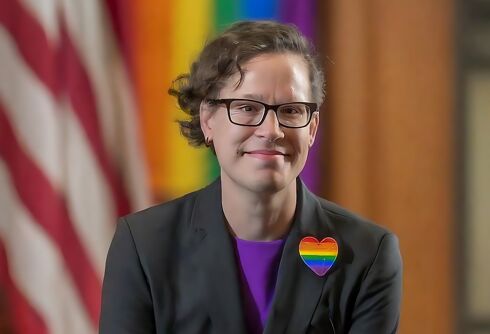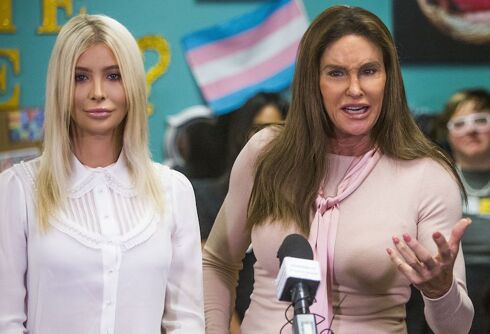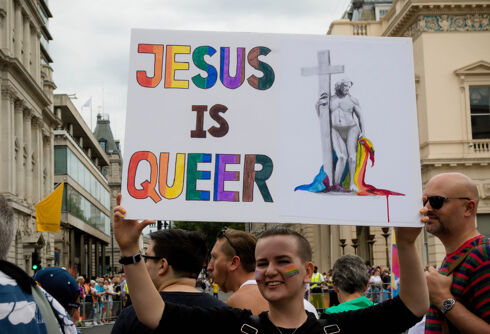In 1986, the United States looked very different than it does today.
Ronald Reagan was president. It was the year of the Space Shuttle Challenger disaster and the blockbuster film Top Gun. LGBT people were largely marginalized. Latinos hadn’t yet become a surging political force. And while AIDS had begun claiming countless in the gay community, it was only in 1985 that the larger public became more fully aware, due to the sensationalized death of star Rock Hudson.

It was in this era of the so-called “Moral Majority”, a largely white, conservative, Christian view of America, that author Michael Nava crafted one of the most unlikely of literary heroes: Henry Rios, a gay, Latino criminal attorney with a passion for justice. Himself an outsider, Rios acted on behalf of those without a voice, often wrongly accused of crimes. While introduced in The Little Death, Rios would go on to solve mysteries in a series of seven books, culminating with Rag and Bone in 2001.
The Rios series would go on to win five Lambda Literary Awards, and Nava honored by The Publishing Triangle with the Bill Whitehead Lifetime Achievement Award for Gay and Lesbian literature.
Never Miss a Beat
Subscribe to our newsletter to stay ahead of the latest LGBTQ+ political news and insights.
As the revolutionary Henry Rios series finally comes to e-book, Michael Nava took time to share more with me about the development of the character, his thoughts on bringing an end to the Rios series, and his forthcoming novel, The City of Palaces.
Kergan Edwards-Stout: You first gained literary acclaim for your Henry Rios mystery series. How did the tales originate?
Michael Nava: I started writing the first novel almost as a lark in my last year at law school. I was working from 10 p.m. to 6 a.m. at the Palo Alto jail, where I interviewed men who had been arrested to determine if they were eligible for immediate release on their own recognizance or would have to post bail the next day. Palo Alto didn’t have that much crime so I spent many nights just waiting around or trying to study. At some point, I started writing what became The Little Death; indeed the very first scene has Rios walking into a jail which was the Palo Alto jail.
Edwards-Stout: Your lead character, a gay Latino criminal attorney involved in solving mysteries, broke many barriers. Were you conscious of how groundbreaking he might be?
Nava: At that point I wasn’t thinking about being published, much less writing a series, but it never occurred to me that he would not be gay and Latino. I wanted to write a book I would have wanted to read, and what I wanted to read about was the experience of being gay. This was in 1980 when there were very few books by openly gay writers and most of those involved the New York sexual demi-mode or were coming out stories. I was already out and I was less interested in gay sex than in gay identity. Fortunately, I found inspiration in the marvelous mystery novels of Joseph Hansen…
Edwards-Stout: His books were terrific.
Nava: His matter-of-fact depiction of a gay PI, Dave Brandstetter, who was competent at his job and unapologetic in his sexual orientation, was my immediate inspiration for Rios.
 Edwards-Stout: I recently revisited Golden Boy, the second in your series. I remember, when I first read the books, I was focused more on how you married the mystery angle with a gay Latino lead. What struck me about the book, reading it this time, was how Rios navigates through the class system. He interacts with everyone from the uppermost elite to folks on the street. Were you conscious of that element, while writing him?
Edwards-Stout: I recently revisited Golden Boy, the second in your series. I remember, when I first read the books, I was focused more on how you married the mystery angle with a gay Latino lead. What struck me about the book, reading it this time, was how Rios navigates through the class system. He interacts with everyone from the uppermost elite to folks on the street. Were you conscious of that element, while writing him?
Nava: Perhaps not so much in that second book, but by the third book, How Town, I was increasingly conscious of his status which I call the outsider/insider. This person – male in my novels but, in life, just as often or more often a woman – is someone who belongs to a dispossessed minority group but who nonetheless achieves some degree of status and authority within the dominant culture.
Edwards-Stout: Can you expand on that?
Nava: Henry Rios, for example, is a gay Latino (and also a recovering alcoholic and a child of the poor) who is also a first-rate lawyer with a law degree from Stanford University. The Rios novels are as much about how Rios experienced his double reality (despised spic faggot on the one hand, learned counsel for the defense on the other) as they are about whodunit and why. That’s what gives the novels their continuing moral and cultural relevance.
As America’s complexion darkens, there are many young men and women from “minority” communities, particularly Latino and Asian kids who are confronted with the doubleness of identity. Like Rios, they are the first in their families to attend college and to gain a foothold in the professional world. And if these kids are LGBT as well, then Rios really speaks to their experience and, to gather from what tell me, provides them with some hope and inspiration.
Edwards-Stout: In the series, you also included various characters battling with HIV. How has the AIDS crisis impacted you personally?
Nava: The first book was started in 1980, completed in 1984, and published in 1986–and readers will notice that AIDS is not mentioned. By the second book, Goldenboy, written in 1987 and published in 1988, AIDS was sweeping the gay male community, overwhelming every other concern. I could not write about that community without also becoming an AIDS writer.
Like many other gay men of my generation – I’m 58 now – HIV/AIDS was the air I breathed for a decade: watching friends sicken and die, visiting hospital rooms, attending memorials, marching in demonstrations, raging at Ronald Reagan and his ilk, and bearing witness to the unbelievable acts of compassion and heroism by gay men AND by lesbian women. Gay male literature was like urgent dispatches from the front lines of a battleground and it was my privilege to be part of that generation of writers. Like my brother writers, I tried to write about the plague as honestly and accurately as I could. I remember receiving a letter from a man who included in the envelope the program of his lover’s memorial. He told me that when he read some of the conversations between Rios and his HIV-positive lover, Josh Mandel, it was as if I had recorded his conversations with his partner. He thanked me. I wept.
 Edwards-Stout: How do you feel the LGBT community has dealt with AIDS in the years since the height of the epidemic?
Edwards-Stout: How do you feel the LGBT community has dealt with AIDS in the years since the height of the epidemic?
Nava: Well, it was very odd that when antiretroviral therapies became widely available and gay men stopped dying in the numbers that they had, people stopped talking about AIDS. I felt like a soldier who had returned from the trenches of the Great War to find the Roaring 20s in progress, all jazz and flappers and bathtub gin and no one wanting to hear about the horror anymore. It was a deeply alienating experience and for some time I withdrew from the LGBT community.
In retrospect, I suppose it was understandable that people just wanted a break from the trauma of the plague. But the plague years set in motion much of LGBT civil rights initiatives that are bearing fruit now; it empowered us as only a life-and-death crisis can. I think we need to look back at that time and I see signs that we are at last prepared to do that. Like many other men of my generation, I do find disturbing the increase of seroconversion among younger gay men. HIV may be a more manageable disease but it’s better not to contract it in the first place.
Edwards-Stout: You brought the Henry Rios series to a close with Rag and Bone in 2001. The character, at that time, was battling a host of issues, around mortality, identity, and family. When the book was released, you noted that not only would it bring an end to his tales, but that it was also the end of your journey as a writer of mysteries. Why was closing his tale so important to you, and how does that coincide with your decision to no longer work in that genre?
Nava: There were a number of things going on. I’d written or co-written eight books in 15 years while also writing essays, journalism and other pieces, while simultaneously practicing law full time and attempting to have a personal life. The well was dry. I also felt I had gone as far as I could as a writer with the mystery genre and that I was in danger of becoming formulaic. Moreover, I didn’t have much else to say about the experience of being a gay man and I found myself increasingly more interested in exploring the Latino part of my personal identity. I had already begun the research for the series of historical novels that I am currently writing, and that was where I wanted to go as a writer. I didn’t realize it would take me another decade to write the first novel in that series.
Edwards-Stout: Do you have any regrets about ending it?
Nava: None at all.
Edwards-Stout: With the series now being released in e-book, how does it feel to revisit them?
Nava: What I see most clearly now is that Henry Rios is a unique character in American literature in both his specificity — gay, Mexican-American, professional man — and in his sensibility. He is neither a victim nor a stereotype. He is someone who rejected society’s classification of homosexuals as sick, sinful or criminal and chose instead to trust his own experience of himself as a decent and compassionate human being. That doesn’t sound like a radical consciousness today, but you must remember when Rios was a boy in the 1950s and 1960s, there was still a sodomy law in California, and no open homosexual would have been licensed to practice law; homosexuals were defendants, not lawyers. His faith in his own good character was without precedent. He paid a price. In the novels he struggles with alcoholism, with a tendency toward what I suppose is codependence, with his unexpressed rage, but his demons never overwhelm him. He is a wounded but sympathetic character. I think that’s why so many readers took him to heart.
Edwards-Stout: When you add in your other various elements, not only of being a writer of everything from novels to poetry, but an attorney, a gay man, of being of Mexican descent, and I’m sure a whole host of other things, it’s no wonder that identity is a recurring theme in your work. Where are you now in terms of all of these aspects existing within you?
Nava: My baseline is not being gay or Latino or a writer. My baseline is curiosity. I live to learn and I love being around people who can teach me something new. I am so fortunate to lead a life that gives me the time and opportunity to indulge my curiosity. I feel more hopeful, more interested, and more engaged in life at 58 than at any time before.
Edwards-Stout: Whether writing mysteries, or in your book Created Equal, or in your legal work, the concept of right and wrong, of justice being served, rings through clearly. Where did such strong convictions come from?
Nava: They come from having been trod underfoot. I am queer, Latino, and a child of the poor. No one is more fiercely committed to the idea of justice than those who have been treated unjustly, or more passionate about equality than those who have been denied it.
Edwards-Stout: You’ve received a host of awards for your writing, including the Publishing Triangle’s Bill Whitehead Award for Lifetime Achievement in 2001. At that point, you hadn’t yet turned 50. What affect did receiving such an award so young have on you?
Nava: That award came as a complete surprise. In my acceptance speech I wondered if the judges knew something about my health I didn’t. It was a tremendous honor. I accepted it not only as recognition for my past work, but also as encouragement for the books I had yet to write. I just didn’t know it would take so damn long to write the next one!
Edwards-Stout: I’m curious about your life since Rag and Bone was published. You dove more fully into the legal arena, and even ran for judge in 2010, which ultimately went to the incumbent.
 Nava: I moved from Los Angeles to San Francisco in 1996, in part because so many friends and acquaintances had died in the plague that LA seemed at times like a vast cemetery to me. I was writing The Burning Plain at that point and its bleakness reflects my own mental state. Rag and Bone was more hopeful, but I was still quite exhausted and depressed. It was helpful to me to shift my focus from literature to the law. I became interested in the issue of diversity in the legal profession – or, rather, the lack of diversity.
Nava: I moved from Los Angeles to San Francisco in 1996, in part because so many friends and acquaintances had died in the plague that LA seemed at times like a vast cemetery to me. I was writing The Burning Plain at that point and its bleakness reflects my own mental state. Rag and Bone was more hopeful, but I was still quite exhausted and depressed. It was helpful to me to shift my focus from literature to the law. I became interested in the issue of diversity in the legal profession – or, rather, the lack of diversity.
Even now, in California where Latinos make up more than 30% of the population, the legal profession is 75% white, and overwhelming straight and male. This lack of diversity is a serious issue because the credibility of the justice system depends entirely upon a perception that it delivers fair results. It’s hard for people of color to trust a system where no one in authority looks like them. Moreover, it offended my own sense of equality. So, I threw myself into the cause. I served on a state bar committee investigating the issue, wrote op/ed pieces and a law review article on the subject, sat on panels and gave a lot of speeches. I mentored law students of color.
Ultimately, I put my money where my mouth was and ran for judge to highlight the lack of diversity on the San Francisco court (where out of almost 60 judges, only two were Latino/a and there had never been a gay or lesbian judge of color.) After my narrow loss in the 2010 election, I needed to step back from that activism. Running for office was a real stretch for an introvert like me. I took a year to think about where I wanted to put my energies as I entered the last third of my life and I came back to writing.
Edwards-Stout: I’ve also heard rumors that you have other works up your sleeve… A whole new series, called The Children of Eve.
Nava: Yes. These books represent the culmination of the various themes of identity I have been exploring in the years since I published the last Rios novel. Set in Mexico, Arizona and Hollywood between 1895 and 1929, they are based very loosely on the life of the silent film star, Ramon Novarro – a gay, Mexican immigrant who achieved international fame in the 1925 version of Ben Hur – and my grandfather who was a Yaqui Indian; a tribe whose ancient homeland is in the modern-day Mexican state of Sonora. A central theme of the novels is how America’s very image of itself is in large part the creation of immigrants of color whom America exploited and oppressed. They are, in the language of the gospel of St. Mark, the stone the builders rejected that has become the cornerstone. Nothing more dramatically illustrates that point than Novarro’s career. Driven with his family out of Mexico during the Mexican revolution, he barely spoke English and yet he became one of the first generation of internationally known movie stars.
My grandfather’s life, in a much quieter way, is also illustrative of what generations of immigrants endured. He too was a refugee from Mexico, cast into America at the age of 15 to sink or swim. To the world, he was just another dark-skinned cannery worker. To me, he was an intelligent, tortured, complex man–a survivor of a little genocide that occurred at the end of the nineteenth century when the Mexican government attempted to exterminate the Yaqui Indians to take their homeland. These are the American stories that haven’t been told but must be.
Edwards-Stout: The first book is called The City of Palaces, right? I see you have the first three chapters on your website.
Nava: The first novel tells the story of Mexico in the years just before and at the beginning of the Mexican Revolution as seen through the eyes of an upper-class Mexico City family. I think of it as Doctor Zhivago meets One Hundred Years of Solitude. While my agent looks for a publisher for it, I am working on the second novel, which includes silent films, Buffalo soldiers, the Mexican Revolution, and the tragic history of the Yaquis among its themes.
Edwards-Stout: What are your thoughts on the current state of gay literature?
Nava: The mainstream publishing world has essentially turned its back on LGBT literature, particularly our fiction. Fortunately, mainstream publishers are no longer the cultural gatekeepers they were when I started publishing. Small publishers, university presses and, above all, online self-publishing provides so many more platforms for LGBT writers to get their work out. The democratizing of publishing is a boon to gay literature. There is a lot of work out there and some of it, like your own book, Kergan, is quite splendid.
Edwards-Stout: That is high praise indeed, coming from someone I’ve long admired… Thank you! Let me ask you, with gay marriage increasingly becoming possible, and HIV considered by many to be “manageable,” what do you see as our community’s next battles? Or have we truly entered the so-called “Post Gay” era?
Nava: The battle for fundamental equality is far from over. There are any number of states that still don’t have basic anti-discrimination laws protecting LGBT people in their jobs and houses, not to mention all those states, including California, that wrote marriage discrimination into their state constitutions. It’s great to be gay if you live in New York but not so much if you live in Kentucky or Wyoming. That being said, the wind is at our backs and the advances that we have made in my lifetime are stunning. I remember having a conversation with the novelist David B. Feinberg in the early 90s and wondering what it would feel like to wake up in the morning not already consumed with rage over the treatment of people with AIDS and LGBT people generally. Now I know. It feels great.
Edwards-Stout: Moving forward, with all of your varied passions and interests, where would you like to see yourself in 10 years?
Nava: For me, life’s most indelible lesson is that I only really have today. I look for the joy in the moment. The future will take care of itself.













